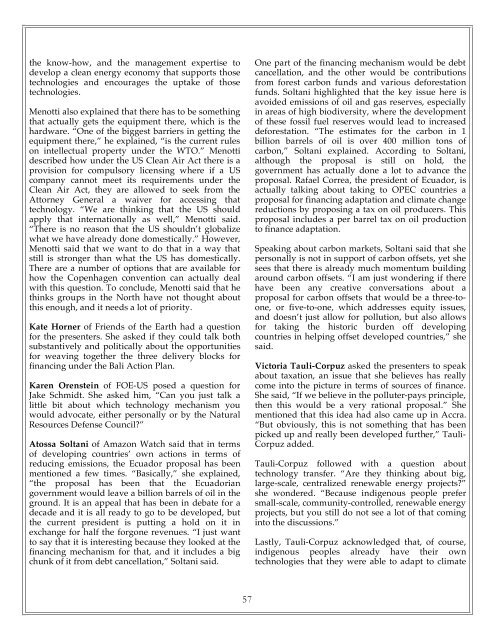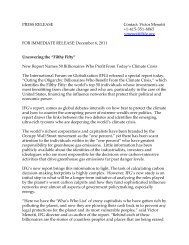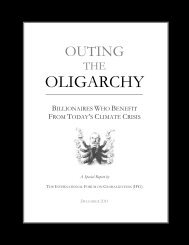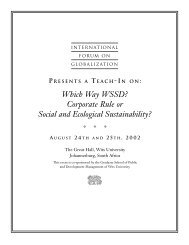UNDRIP Report - English FINAL - International Forum on Globalization
UNDRIP Report - English FINAL - International Forum on Globalization
UNDRIP Report - English FINAL - International Forum on Globalization
You also want an ePaper? Increase the reach of your titles
YUMPU automatically turns print PDFs into web optimized ePapers that Google loves.
the know-how, and the management expertise to<br />
develop a clean energy ec<strong>on</strong>omy that supports those<br />
technologies and encourages the uptake of those<br />
technologies.<br />
Menotti also explained that there has to be something<br />
that actually gets the equipment there, which is the<br />
hardware. “One of the biggest barriers in getting the<br />
equipment there,” he explained, “is the current rules<br />
<strong>on</strong> intellectual property under the WTO.” Menotti<br />
described how under the US Clean Air Act there is a<br />
provisi<strong>on</strong> for compulsory licensing where if a US<br />
company cannot meet its requirements under the<br />
Clean Air Act, they are allowed to seek from the<br />
Attorney General a waiver for accessing that<br />
technology. “We are thinking that the US should<br />
apply that internati<strong>on</strong>ally as well,” Menotti said.<br />
“There is no reas<strong>on</strong> that the US shouldn’t globalize<br />
what we have already d<strong>on</strong>e domestically.” However,<br />
Menotti said that we want to do that in a way that<br />
still is str<strong>on</strong>ger than what the US has domestically.<br />
There are a number of opti<strong>on</strong>s that are available for<br />
how the Copenhagen c<strong>on</strong>venti<strong>on</strong> can actually deal<br />
with this questi<strong>on</strong>. To c<strong>on</strong>clude, Menotti said that he<br />
thinks groups in the North have not thought about<br />
this enough, and it needs a lot of priority.<br />
Kate Horner of Friends of the Earth had a questi<strong>on</strong><br />
for the presenters. She asked if they could talk both<br />
substantively and politically about the opportunities<br />
for weaving together the three delivery blocks for<br />
financing under the Bali Acti<strong>on</strong> Plan.<br />
Karen Orenstein of FOE-US posed a questi<strong>on</strong> for<br />
Jake Schmidt. She asked him, “Can you just talk a<br />
little bit about which technology mechanism you<br />
would advocate, either pers<strong>on</strong>ally or by the Natural<br />
Resources Defense Council?”<br />
Atossa Soltani of Amaz<strong>on</strong> Watch said that in terms<br />
of developing countries’ own acti<strong>on</strong>s in terms of<br />
reducing emissi<strong>on</strong>s, the Ecuador proposal has been<br />
menti<strong>on</strong>ed a few times. “Basically,” she explained,<br />
“the proposal has been that the Ecuadorian<br />
government would leave a billi<strong>on</strong> barrels of oil in the<br />
ground. It is an appeal that has been in debate for a<br />
decade and it is all ready to go to be developed, but<br />
the current president is putting a hold <strong>on</strong> it in<br />
exchange for half the forg<strong>on</strong>e revenues. “I just want<br />
to say that it is interesting because they looked at the<br />
financing mechanism for that, and it includes a big<br />
chunk of it from debt cancellati<strong>on</strong>,” Soltani said.<br />
One part of the financing mechanism would be debt<br />
cancellati<strong>on</strong>, and the other would be c<strong>on</strong>tributi<strong>on</strong>s<br />
from forest carb<strong>on</strong> funds and various deforestati<strong>on</strong><br />
funds. Soltani highlighted that the key issue here is<br />
avoided emissi<strong>on</strong>s of oil and gas reserves, especially<br />
in areas of high biodiversity, where the development<br />
of these fossil fuel reserves would lead to increased<br />
deforestati<strong>on</strong>. “The estimates for the carb<strong>on</strong> in 1<br />
billi<strong>on</strong> barrels of oil is over 400 milli<strong>on</strong> t<strong>on</strong>s of<br />
carb<strong>on</strong>,” Soltani explained. According to Soltani,<br />
although the proposal is still <strong>on</strong> hold, the<br />
government has actually d<strong>on</strong>e a lot to advance the<br />
proposal. Rafael Correa, the president of Ecuador, is<br />
actually talking about taking to OPEC countries a<br />
proposal for financing adaptati<strong>on</strong> and climate change<br />
reducti<strong>on</strong>s by proposing a tax <strong>on</strong> oil producers. This<br />
proposal includes a per barrel tax <strong>on</strong> oil producti<strong>on</strong><br />
to finance adaptati<strong>on</strong>.<br />
Speaking about carb<strong>on</strong> markets, Soltani said that she<br />
pers<strong>on</strong>ally is not in support of carb<strong>on</strong> offsets, yet she<br />
sees that there is already much momentum building<br />
around carb<strong>on</strong> offsets. “I am just w<strong>on</strong>dering if there<br />
have been any creative c<strong>on</strong>versati<strong>on</strong>s about a<br />
proposal for carb<strong>on</strong> offsets that would be a three-to<strong>on</strong>e,<br />
or five-to-<strong>on</strong>e, which addresses equity issues,<br />
and doesn’t just allow for polluti<strong>on</strong>, but also allows<br />
for taking the historic burden off developing<br />
countries in helping offset developed countries,” she<br />
said.<br />
Victoria Tauli-Corpuz asked the presenters to speak<br />
about taxati<strong>on</strong>, an issue that she believes has really<br />
come into the picture in terms of sources of finance.<br />
She said, “If we believe in the polluter-pays principle,<br />
then this would be a very rati<strong>on</strong>al proposal.” She<br />
menti<strong>on</strong>ed that this idea had also came up in Accra.<br />
“But obviously, this is not something that has been<br />
picked up and really been developed further,” Tauli-<br />
Corpuz added.<br />
Tauli-Corpuz followed with a questi<strong>on</strong> about<br />
technology transfer. “Are they thinking about big,<br />
large-scale, centralized renewable energy projects?”<br />
she w<strong>on</strong>dered. “Because indigenous people prefer<br />
small-scale, community-c<strong>on</strong>trolled, renewable energy<br />
projects, but you still do not see a lot of that coming<br />
into the discussi<strong>on</strong>s.”<br />
Lastly, Tauli-Corpuz acknowledged that, of course,<br />
indigenous peoples already have their own<br />
technologies that they were able to adapt to climate<br />
57







